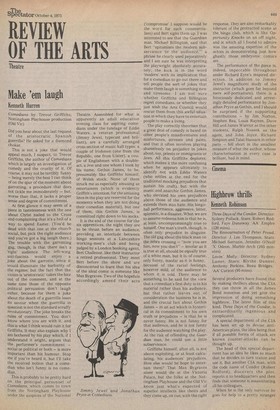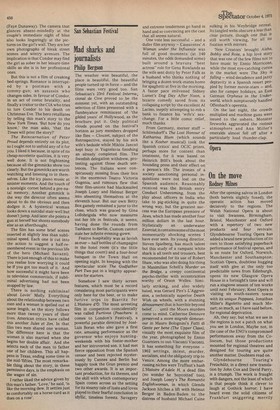Cinema
Highbrow thrills
Kenneth Robinson
Three Days of the Condor. Director: Sydney Pollack. Stars: Robert Redford, Faye Dunaway AA' Empire (120 mins).
The Reincarnation of Peter Proud. Director: J. Lee Thompson. Stars: Michael Sarrazin, Jennifer O'Neill 'X' Odeon, Marble Arch (105 minutes) Lavin' Molly. Director: Sydney Lumet. Stars: Blythe Danner, Anthony Perkins, Beau Bridges. 'AA' Curzon (95 mins).
Several producers have found that by making thrillers about the CIA they can throw in all the James Bond nonsense and yet give the impression of doing something highbrow. The latest film of this kind, Three Days of the Condor, is extraordinarily ingenious and complicated.
A special department of the CIA has been set up to devise antiAmerican plans, the idea being that if all possible forms of attack are known counter-attacks can be thought up.
The head of this special department has an idea he likes so much that, he decides to turn traitor and use it. But another CIA man, with the code name of Condor (Robert Redford), discovers the plot, reports it to headquarters and then finds that someone is assassinating all his colleagues.
When he is the only survivor he goes for help to a pretty stranger (Faye Dunaway). The camera that glances absent-mindedly at the couple's immediate night of bliss also looks lingeringly at the pictures on the girl's wall. They are her own photographs of bleak street scenes and wintry avenues. The implication is that Condor may find the girl as sober in her leisure-time skills as she is in her professional ones.
But this is not a film of creaking bed-springs. Romance is interrupted by a postman with a tommy-gun; an assassin who changes sides, in favour of Condor, in an act of comic brutality, and finally a traitor to the CIA who tries to lure Condor to his death on Christmas Eve. The hero retalliates by telling this man's story to the New York Times. 'But how do you know,' the man asks, 'that the Times will print the story?'
The Reincarnation of Peter Proud depends entirely on its plot, so I ought not to unfold any of it for you. I liked it because, in spite of its cheap-novelette qualities, it is very well done. It is not frightening because all the gimmicks show too clearly. But the gimmicks are worth watching and listening to in themselves. Like the icy piano music at sinister moments. And the touch of a nostalgic cornet behind a pre-natal memory. Another gimmick is the way the director often seems about to do the obvious and then dodges it. A hysterical woman looks down a suicidal stair-well but doesn't jump. And later she points a gun at herself but shoots somebody else as an afterthought.
The film has some brief scenes inserted at slightly less than subliminal speed. Each one is cut into the action to suggest a half-remembered event in the previous life of the hero (Michael Savazzi). There is just enough of this to make you realise how worrying it could be if you got too much of it. And how successful it might have been in television commercials, if subliminal advertising had not been stopped by law.
There is nothing subliminal about Lovin' Molly. Everything about the relationship between two men and a woman is spelled out at some length, as the story follows more than twenty years of their lives. American critics have called this another Jules et Jim. In that film two men shared one woman. The difference here is that the woman is also married when she begins her double affair. And she selects each of the men to father one of her children. This all happens in Texas, ending some time in the mid-fifties. The most remarkable thing about the story, in these permissive days, is the emphasis on the wages of sin.
I rather liked the advice given by this man's father. 'Love,' he said, 'is like the morning dew. It settles just as comfortably on a horse-turd as it does on a rose'.



































 Previous page
Previous page